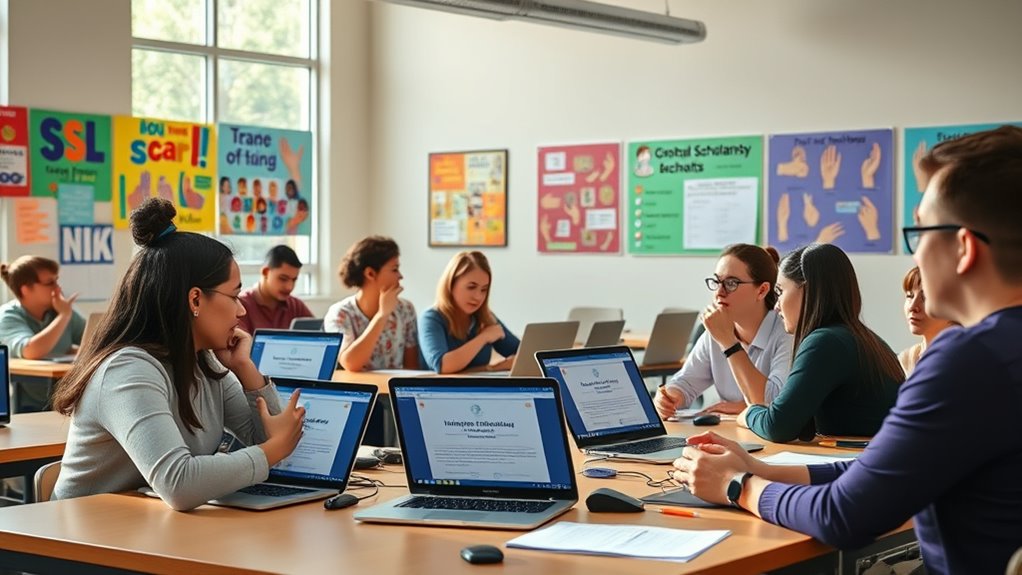Scholarship opportunities for deaf and hard-of-hearing learners are essential for affordable access to higher education. These scholarships often prioritize support for sign language programs, accessibility technology, and fostering inclusive environments. By securing such funds, you can boost your academic and social success while affirming your cultural identity. Many programs also recognize advocacy efforts and technical needs. To discover the best options tailored to your goals, continue exploring the key resources and organizations available to support you.
Key Takeaways
- Many scholarships specifically support deaf and hard-of-hearing students focusing on sign language programs and accessibility tech.
- Applications often require demonstrating how tools like captioning or hearing devices improve communication access.
- Scholarships may also fund sign language fluency development, cultural identity, and advocacy involvement.
- Look for organizations partnering with educational institutions or tech providers offering comprehensive support packages.
- The right scholarship can provide financial aid, foster inclusion, and promote academic and social success.

Finding the right scholarship can open doors for deaf and hard-of-hearing learners, providing essential financial support to pursue higher education. But securing a scholarship isn’t just about the money; it’s also about finding programs that recognize your unique needs and strengths. Many scholarships are specifically designed for students who are deaf or hard of hearing, often emphasizing the importance of accessible learning environments. When exploring these opportunities, you’ll want to look for ones that support the integration of sign language programs and accessibility technology, as these can considerably enhance your educational experience.
Sign language programs are essential for many deaf students, serving as a primary mode of communication and learning. Scholarships that fund or endorse sign language education not only help you develop fluency but also affirm the value of your cultural and linguistic identity. Some scholarships are tied to organizations that promote sign language proficiency, encouraging you to strengthen your skills while pursuing your academic goals. These programs often offer workshops, courses, or mentorship opportunities that deepen your connection to the deaf community, making your educational journey more meaningful.
Sign language scholarships support fluency and affirm cultural identity through workshops, courses, and mentorship opportunities.
Accessibility technology is another key aspect of many scholarship opportunities. Advances in this area—such as real-time captioning, video relay services, and hearing assistive devices—are transforming the way deaf students engage with their coursework. Scholarships that support the acquisition or use of accessibility technology can ease communication barriers, allowing you to participate fully in lectures, discussions, and extracurricular activities. Many institutions and organizations recognize that investing in accessibility technology can level the playing field, giving you equal opportunities to succeed academically. Supporting assistive devices can significantly improve your learning experience and independence.
When searching for scholarships, it’s beneficial to focus on those that explicitly mention support for sign language programs or accessibility technology. These awards often require you to demonstrate how these tools will enhance your learning experience. Be prepared to share your goals for improving communication access or your involvement in sign language advocacy. Also, look for organizations that partner with educational institutions or technology providers, as they tend to offer all-encompassing support packages.
Ultimately, the right scholarship can be a game-changer, not just financially but in empowering you to thrive academically and socially. By targeting opportunities that prioritize sign language programs and accessibility technology, you position yourself for a more inclusive and supportive educational environment. Remember, your pursuit of higher education is about more than just funding—it’s about finding resources that acknowledge your identity and help you succeed on your terms.
real-time captioning device for deaf students
As an affiliate, we earn on qualifying purchases.
As an affiliate, we earn on qualifying purchases.
Frequently Asked Questions
Are There Scholarships Specific to Different Types of Hearing Loss?
You might wonder if scholarships exist for different hearing loss types. Yes, there are disability-specific funding options tailored to various hearing impairments, such as sensorineural or conductive hearing loss. These scholarships often focus on supporting students with particular hearing loss types, helping you access resources suited to your needs. Research organizations and foundations that target your specific hearing loss type to discover opportunities designed to assist your educational journey.
How Can I Find Local Scholarship Programs for Deaf Students?
To find local scholarship programs for deaf students, start by researching community outreach events and organizations dedicated to supporting deaf and hard-of-hearing individuals. Check their websites or contact them directly for scholarship opportunities. Stay organized by noting scholarship deadlines and application requirements. Additionally, visit local colleges, schools, and libraries for flyers and resources. Networking within your community can also lead to valuable information and support in securing these scholarships.
Do Scholarship Applications Require Proof of Hearing Impairment?
Did you know that over 80% of scholarship applications require verification of eligibility? When you apply, the process often involves providing documentation, which may include proof of hearing impairment, depending on the scholarship’s eligibility criteria. Not all applications demand this proof, so it’s essential to carefully review the application process and eligibility criteria for each scholarship to ensure you include the right documents and meet the requirements.
Are There Scholarships Available for Postgraduate Deaf Students?
You’ll find plenty of graduate funding options and research grants specifically for postgraduate deaf students. Many organizations support advanced education through scholarships tailored for your needs. You should explore university resources, government programs, and deaf community foundations, as they often provide targeted financial aid. Applying for these grants typically involves demonstrating your academic goals and hearing status, helping you secure the funding needed to continue your studies successfully.
What Resources Assist With Applying for Deaf or Hard-Of-Hearing Scholarships?
Imagine steering the complex world of scholarships with confidence, not confusion. You can find resources like assistive technology to help complete applications or communicate effectively. Peer mentorship programs are also invaluable—they connect you with others who’ve been through the process. These tools make applying easier, ensuring you don’t face hurdles alone. Use these resources to strengthen your application and increase your chances of securing a scholarship tailored for deaf or hard-of-hearing students.

Iconoglyph American Sign Language Game Tiles | ASL Alphabet, Wood Letter Tiles – Learn ASL While Having Fun!
Immersive ASL Learning: Transform game night into an engaging ASL lesson! These tiles provide a hands-on way to…
As an affiliate, we earn on qualifying purchases.
As an affiliate, we earn on qualifying purchases.
Conclusion
As you navigate the path toward higher education, these scholarships are like guiding stars lighting your way through a night sky filled with endless possibilities. With each opportunity, you step closer to your dreams, feeling the warmth of support behind you. Imagine a future where your voice is heard, your talents shine brightly, and barriers fade into the horizon. Keep reaching — your journey is just beginning, and these scholarships are here to help you soar.

Williams Sound Pocketalker Ultra Hearing Amplifier | Easy-to-Use Hearing Amplifier for Seniors | Amplified Sound Assistive Listening Device with Headphones for Elderly | Hearing Assist Earbuds
Pocketalker Ultra makes voices and conversations easier to hear by boosting the sounds you want while reducing background…
As an affiliate, we earn on qualifying purchases.
As an affiliate, we earn on qualifying purchases.

Aiphone Corporation RY-ES External Signaling Relay for Audio and Video Intercoms, ABS Plastic Construction
Weather resistant
As an affiliate, we earn on qualifying purchases.
As an affiliate, we earn on qualifying purchases.










